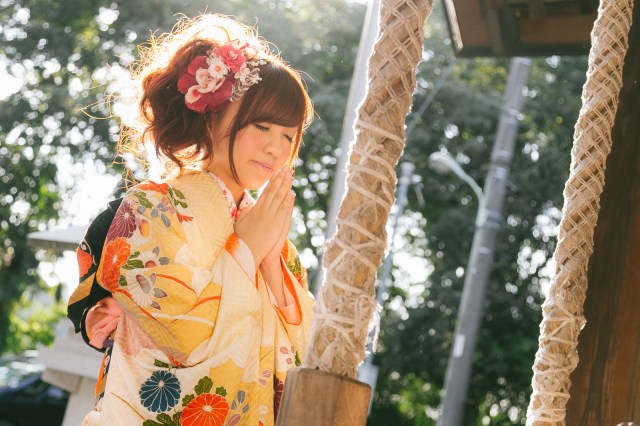
Nagasaki priest says over-tourism, vandalism and theft of amulets led to his controversial decision.
In Japan, a lot of importance is placed on behaving well and respecting traditions and etiquette, and nowhere are these virtues more valued than at a holy place of worship, such as a temple or shrine.
For one shrine priest in Nagasaki Prefecture, however, the lack of respect displayed by visiting worshippers has become such a problem that he’s now decided to take issues into his own hands, announcing on Twitter that he would be banning all foreign tourists.
The tweet, from the head priest of Watatsumi Shrine, which lies on the island of Tsushima, says the blanket ban on all foreign tourists is due to bad behaviour by Korean visitors, involving abusive language and aggressive conduct from tour guides and theft of talismans by tourists.
▼ The ban on “foreigners” is mentioned in the first screenshot on the left.
https://twitter.com/watazumi55/status/1214811255266934786Tsushima’s location, in between the Korea Strait and the Tsushima Strait, roughly halfway between the Japanese mainland and the Korean peninsula, means the shrine receives a large number of Korean tourists. The priest says the shrine is currently suffering from over-tourism, with up to 30-40 tour buses dropping people off on the grounds on a busy day so they can take photos on the picturesque grounds.
https://twitter.com/watazumi55/status/1215235210817617920While the ban covers all foreigners, the priest has specifically taken issue with visitors from Korea, one of whom was a YouTuber who filmed the grounds and people at the shrine without permission. He’s also been dismayed by tourists sitting on the side of the road eating food, as the land past the white line is said to be part of the shrine grounds.
https://twitter.com/watazumi55/status/1215110995623866368There’s also the issue of vandalism by Korean visitors, who’ve etched their names into a wooden board dedicated to the hanging of ema votive plaques.
https://twitter.com/watazumi55/status/1214572326538248192The priest says he’s also had a problem with the conduct of tour guides, who stand on the steps at the front of the haiden, a hall of worship, despite him asking them not to do so. On a busy day, he’s cautioned up to 40 guides, which is something he says he does from 9 a.m. to 5 p.m. from spring through to summer.
https://twitter.com/watazumi55/status/1215109247152705536Some tour guides are also said to take 10 to 20 minutes to explain the site while standing in sacred entryways that block the path for local worshippers.
https://twitter.com/watazumi55/status/1215107328472535040As a result of all these issues, the priest decided to place a ban on all foreign tourists, saying:
“Let me say, if you think this is hate or a violation of human rights, please discuss it directly with me. We cannot put up with the destruction of a site of worship.”
That still hasn’t stopped overseas tourists from visiting, however, as the tour guides are still bringing travellers to the shrine, and are said to react aggressively when the priest asks to speak to them.
▼ The priest says this tour guide said he would strangle him and told him to “die”.
https://twitter.com/watazumi55/status/1215156253749465088There are two sides to every story, of course, and looking back at the long history of Japan-Korea tensions reveals Tsushima has been a highly contentious island for decades. Despite being a part of Japan’s Nagasaki Prefecture, Tsushima is known as “Daemado” in Korean, and the South Korean city of Changwon claims the island is part of their country’s territory, despite having no official territorial claim to the land.
A number of Koreans have also commented on the Japanese flags displayed at Watatsumi Shrine, which for many represent a sense of animosity as it brings back memories of their country’s war-torn past. The priest, however, makes no apology for displaying the flags, saying it’s a traditional flag with “a beautiful design that symbolises the sun”.
Against this background, the dispute between the priest and the Korean tourists sadly doesn’t look like it’s going to be resolved anytime soon. And while vandalising property is a crime, restricting access to people on the basis of race, like Japanese storeowners and onsen operators have done in the past, is also against the law.
While we’re yet to see whether there will be any legal repercussions for the shrine and its head priest, here’s hoping a respect for religion and sacred sites on both sides of the divide will bring both parties together to discuss the issues at hand and eventually bring about a peaceful resolution. Otherwise, it won’t just be Japanese and Koreans, but people from all backgrounds who will end up suffering the consequences.
Source: Hachima Kikou
Top image: Pakutaso
● Want to hear about SoraNews24’s latest articles as soon as they’re published? Follow us on Facebook and Twitter!

 Akutai Matsuri: Japan’s Verbal Abuse Festival, where insults and bad behaviour are encouraged
Akutai Matsuri: Japan’s Verbal Abuse Festival, where insults and bad behaviour are encouraged “Cat shrine” status causing problems for Japan’s millennium-old Izumoiwai Shrine
“Cat shrine” status causing problems for Japan’s millennium-old Izumoiwai Shrine Feel what it’s like to be a Shinto shrine maiden with shrine’s experience package for foreigners
Feel what it’s like to be a Shinto shrine maiden with shrine’s experience package for foreigners Tokyo’s 400-year-old Shinto shrine welcomes Roombas to help with annual susuosame ceremony【Video】
Tokyo’s 400-year-old Shinto shrine welcomes Roombas to help with annual susuosame ceremony【Video】 Fake monks targeting foreign visitors to Japan?
Fake monks targeting foreign visitors to Japan? Seaside scenery, history, and so many desserts on Yokohama’s Akai Kutsu【Japan Loop Buses】
Seaside scenery, history, and so many desserts on Yokohama’s Akai Kutsu【Japan Loop Buses】 Sandwiches fit for a sumo served up in Osaka【Taste Test】
Sandwiches fit for a sumo served up in Osaka【Taste Test】 Foreigner’s request for help in Tokyo makes us sad for the state of society
Foreigner’s request for help in Tokyo makes us sad for the state of society Japanese ramen restaurants under pressure from new yen banknotes
Japanese ramen restaurants under pressure from new yen banknotes Japan’s summertime towelket pillowcases are even better with the addition of Ghibli stars【Photos】
Japan’s summertime towelket pillowcases are even better with the addition of Ghibli stars【Photos】 Samurai chick pudding cake is Japan’s newest hard-to-buy, delicious-to-eat treat【Taste test】
Samurai chick pudding cake is Japan’s newest hard-to-buy, delicious-to-eat treat【Taste test】 No talking allowed, at all, at new Tokyo cafe, even when you’re ordering【Videos】
No talking allowed, at all, at new Tokyo cafe, even when you’re ordering【Videos】 Mikado Coffee is a 76-year-old coffee chain with a major celebrity connection
Mikado Coffee is a 76-year-old coffee chain with a major celebrity connection Does Japan’s “Stinky but Tasty” tonkotsu ramen live up to its name?
Does Japan’s “Stinky but Tasty” tonkotsu ramen live up to its name? Stay at a Japanese capsule hotel in Tokyo for less than US$20 a night
Stay at a Japanese capsule hotel in Tokyo for less than US$20 a night McDonald’s new Happy Meals offer up cute and practical Sanrio lifestyle goods
McDonald’s new Happy Meals offer up cute and practical Sanrio lifestyle goods French Fries Bread in Tokyo’s Shibuya becomes a hit on social media
French Fries Bread in Tokyo’s Shibuya becomes a hit on social media Studio Ghibli releases new action figures featuring Nausicaä of the Valley of the Wind characters
Studio Ghibli releases new action figures featuring Nausicaä of the Valley of the Wind characters Red light district sushi restaurant in Tokyo shows us just how wrong we were about it
Red light district sushi restaurant in Tokyo shows us just how wrong we were about it New private rooms on Tokaido Shinkansen change the way we travel from Tokyo to Kyoto
New private rooms on Tokaido Shinkansen change the way we travel from Tokyo to Kyoto Tokyo Tsukiji fish market site to be redeveloped with 50,000-seat stadium, hotel, shopping center
Tokyo Tsukiji fish market site to be redeveloped with 50,000-seat stadium, hotel, shopping center Beautiful Ghibli sealing wax kits let you create accessories and elegant letter decorations【Pics】
Beautiful Ghibli sealing wax kits let you create accessories and elegant letter decorations【Pics】 Japanese city loses residents’ personal data, which was on paper being transported on a windy day
Japanese city loses residents’ personal data, which was on paper being transported on a windy day Studio Ghibli releases Kiki’s Delivery Service chocolate cake pouches in Japan
Studio Ghibli releases Kiki’s Delivery Service chocolate cake pouches in Japan New definition of “Japanese whiskey” goes into effect to prevent fakes from fooling overseas buyers
New definition of “Japanese whiskey” goes into effect to prevent fakes from fooling overseas buyers Our Japanese reporter visits Costco in the U.S., finds super American and very Japanese things
Our Japanese reporter visits Costco in the U.S., finds super American and very Japanese things All-you-can-drink Starbucks and amazing views part of Tokyo’s new 170 meter-high sky lounge
All-you-can-drink Starbucks and amazing views part of Tokyo’s new 170 meter-high sky lounge More foreign tourists than ever before in history visited Japan last month
More foreign tourists than ever before in history visited Japan last month New Pokémon cakes let you eat your way through Pikachu and all the Eevee evolutions
New Pokémon cakes let you eat your way through Pikachu and all the Eevee evolutions Disney princesses get official manga makeovers for Manga Princess Cafe opening in Tokyo
Disney princesses get official manga makeovers for Manga Princess Cafe opening in Tokyo Sales of Japan’s most convenient train ticket/shopping payment cards suspended indefinitely
Sales of Japan’s most convenient train ticket/shopping payment cards suspended indefinitely Sold-out Studio Ghibli desktop humidifiers are back so Totoro can help you through the dry season
Sold-out Studio Ghibli desktop humidifiers are back so Totoro can help you through the dry season Japanese government to make first change to romanization spelling rules since the 1950s
Japanese government to make first change to romanization spelling rules since the 1950s Ghibli founders Toshio Suzuki and Hayao Miyazaki contribute to Japanese whisky Totoro label design
Ghibli founders Toshio Suzuki and Hayao Miyazaki contribute to Japanese whisky Totoro label design Doraemon found buried at sea as scene from 1993 anime becomes real life【Photos】
Doraemon found buried at sea as scene from 1993 anime becomes real life【Photos】 Tokyo’s most famous Starbucks is closed
Tokyo’s most famous Starbucks is closed One Piece characters’ nationalities revealed, but fans have mixed opinions
One Piece characters’ nationalities revealed, but fans have mixed opinions We asked a Uniqlo employee what four things we should buy and their suggestions didn’t disappoint
We asked a Uniqlo employee what four things we should buy and their suggestions didn’t disappoint Princesses, fruits, and blacksmiths: Study reveals the 30 most unusual family names in Japan
Princesses, fruits, and blacksmiths: Study reveals the 30 most unusual family names in Japan 8 Japan-related events to look forward to in 2016!
8 Japan-related events to look forward to in 2016! Kyoto bans tourists from geisha alleys in Gion, with fines for those who don’t follow rules
Kyoto bans tourists from geisha alleys in Gion, with fines for those who don’t follow rules Go to hell: Unzen Hot Springs invites visitors to take an infernal stroll through a field of deadly hell-mouths
Go to hell: Unzen Hot Springs invites visitors to take an infernal stroll through a field of deadly hell-mouths Japanese monk’s breakfasts with cats are the most important/cutest videos of the day
Japanese monk’s breakfasts with cats are the most important/cutest videos of the day The only path to this Nagasaki Shinto shrine gets swallowed by the sea every day【Video】
The only path to this Nagasaki Shinto shrine gets swallowed by the sea every day【Video】 Hit anime Your Name inspires new sake, blessed by priests in the shrine that appears in the movie
Hit anime Your Name inspires new sake, blessed by priests in the shrine that appears in the movie Cool and fun paper craft from the makers of Akafuku — one of Japan’s favorite sweets!
Cool and fun paper craft from the makers of Akafuku — one of Japan’s favorite sweets! Japanese “Exorcism Holiday Plan” for dogs helps rid them of bad spirits in their unlucky years
Japanese “Exorcism Holiday Plan” for dogs helps rid them of bad spirits in their unlucky years Travel around Japan with stunning videos from the 4K ultra HD video library
Travel around Japan with stunning videos from the 4K ultra HD video library Part of the family – Tokyo Shinto shrine’s blessings for children now available for pets too
Part of the family – Tokyo Shinto shrine’s blessings for children now available for pets too Draw-your-own fox charms are one of the highlights of Kyoto’s famous Fushimi Inari Shrine
Draw-your-own fox charms are one of the highlights of Kyoto’s famous Fushimi Inari Shrine Japanese voodoo dolls with foreign politician photo keep getting nailed to town’s shrine trees
Japanese voodoo dolls with foreign politician photo keep getting nailed to town’s shrine trees Akihabara’s otaku shrine celebrates PlayStation 5 launch with ethereal one-night event
Akihabara’s otaku shrine celebrates PlayStation 5 launch with ethereal one-night event Japanese water purification ritual at shrines under threat due to the pandemic
Japanese water purification ritual at shrines under threat due to the pandemic TripAdvisor Japan announces the country’s 10 favorite shrines and temples
TripAdvisor Japan announces the country’s 10 favorite shrines and temples Huge torii gate found in the middle of a busy Kumamoto intersection
Huge torii gate found in the middle of a busy Kumamoto intersection
Leave a Reply